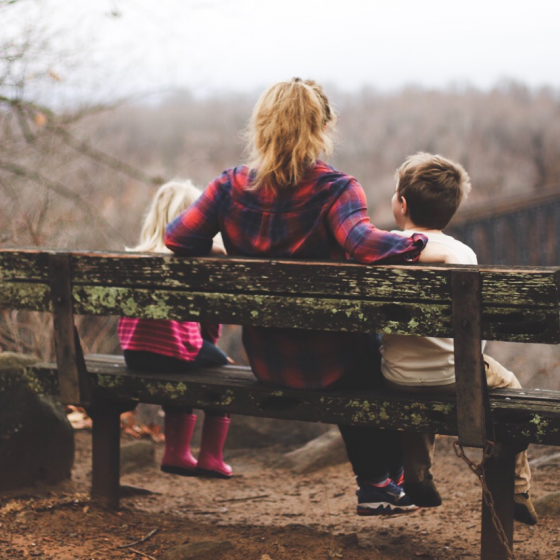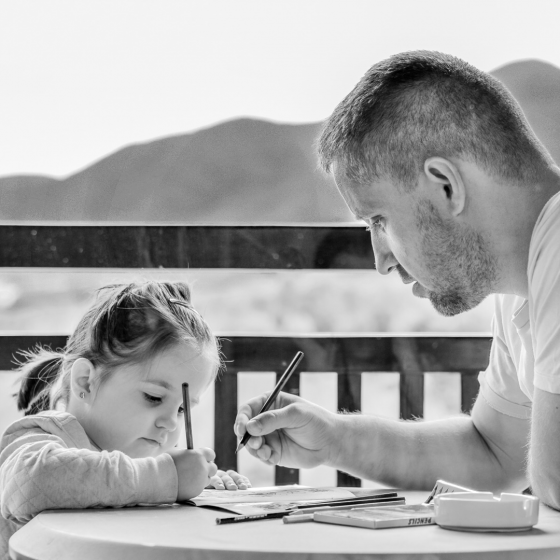CHILDREN WANT TO STAY CONNECTED TO US PARENTS & CAREGIVERS, AND IT’S EASIER TO ACHIEVE THAN WE THINK, ONCE WE STOP PUSHING THEM AWAY.
Written by Sue DeCaro, Parent Coach and Educator
Staying connected to our kids is easier than we think, but it takes work on our part. Children want us parents to see who they really are. When they feel that they are being supported AT THIS LEVEL, rather than molded into what we want or expect them to be, this is when CONNECTION truly happens. Today, parent coach, Sue DeCaro, explores ideas with us about how to see, reach, and stay connected with our children.
When I look at the scenarios being played out with my own clients, I can’t help but think back to the disconnection I had with my own parents which just seemed to be part of my generation. I was raised in a time when kids were to be seen and not heard. For this reason, us kids spent most of our time with each other, and usually outdoors. We practiced self-regulation naturally in our own environment and sorted out our own problems. As long as we were home in time for dinner, our lives were pretty much our own to manage.




A lifetime later, I sit across from one of my own clients and listen as they seek my guidance on how to reach their child – just one of many who seem to be drifting further and further from their reach. Without knowing much detail, or their reasons for seeking out my help, I almost always start off with the same important tip, and that’s teaching them how to create that CONNECTION with their children: it’s key.
Children need to feel close and connected to their parents, but quite often I hear concerned parents tell me that they cannot reach their children. They are shut off to them. But who shut the door first? Where did the disconnection start? Many concerned and frustrated parents who seek me out are focused on their child’s behaviour rather than their feelings. The thing is, the behaviour stems from the feelings which are stuck behind them. So the WHY is very important in this equation and something I often focus on when education and guiding parents to learn how to reconnect with their children. This is the goal here. If we start with why children are behaving the way they are, we can start to get to the meat of the problem. The behaviour provides us information, clues, as to why the child is acting out. They are reacting to something and speaking to us through their actions which come from their feelings. If they are not choosing to share their words with us, then maybe we can start by joining them in the language that they are comfortable communicating in for the time being – the language of feelings. This language includes words, body language, and most importantly, attentiveness on our part. This requires us parents to show up and pay attention; to show our kids that we are there to listen and understand; to pay attention to THEIR needs.

They want us to honor their likes and dislikes, instead of pushing them into our own agendas. They want us to spend time getting to know them and what they are all about. Once we begin this process, the connection starts to strengthen quite quickly. If you want your children to come to you when things go awry, to share the good, the bad, and the ugly with you, they will first need to know that you are there to listen and help, rather than scold and discipline.
Learning often takes place just by the mistakes our children make. Recently one of my clients told me about her son getting caught in school with a few other boys, writing something that was inappropriate and against the school’s policy. The school called the parents. When the son finally confided in his mom, she said he had a look of shame on his face. This is part of learning from his mistake – he knew he was wrong, acted out of the need for social approval and acceptance with his peers, and not from logical thoughts. The shame on his face and his discomfort in reporting this himself was all a part of his learning and growing. Our question to our children can be what did you learn from this, or how can you make amends for this.
SO WHAT HAPPENS WHEN WE DON’T LISTEN TO OUR CHILDREN AND FORM THAT CONNECTION, BUT RATHER TRY TO FORCE OUR OWN AGENDAS ON THEM. OUR OWN OPINIONS ABOUT WHAT WE THINK THEY ARE FEELING, THINKING AND MOST IMPORTANTLY, THE BIGGEST MISTAKE, IS US THINKING WE ALWAYS KNOW WHAT’S RIGHT FOR THEM?
THE ANSWER IS EASY – THEY BEGIN TO LIE.

One common concern many parents are having is navigating through the lies that their children are telling. When a parent told me about some lies their child was feeding them, it made sense to me which was a good thing. It provided me information about how the parents might be able to react in a positive way to turn this around. There is always a reason for a lie and it is often much deeper than we realize. What we need to do in these trying times as parents is get to the reasons and see past the behaviour. Otherwise, the lies will continue. If we fix the problem, the lies will stop. Easier said than done, but let’s break this down so it makes more sense.
I myself would tell similar lies to those that today’s parents are now concerned about receiving from their children. As I sit and listen, I begin to reflect and contemplate on the opposite side. Thinking back, I remember vividly how the punishments were not fun at all. Yes, I was usually grounded and if I could have stopped the behaviours that caused me so much grief at this age, I would have welcomed this, but it needed to start with my parents understanding how to help me. Back in this generation, parents were not as educated in this area or keen to take on this role. It was a different time. I recall one year in particular, when I lost my privileges to participate in Halloween. To this day, I can still feel the utter sadness and the loss of something so important to me in my childhood. So, I learned through the consequences and the lack of connection, that truth-telling did not benefit me in any way. I lied to protect myself. Rightly so at times. And from my parents perspective, grounding was the only answer to correct my behaviour. It was a vicious circle, but today we are going to explore ways to break this.

KiDS NEWS & REViEWS: What do you think is the first step is in breaking these behaviours? How can we as parents get to the bottom of what’s behind it and reach our children on this level? How do we get them to open up to us? To trust us enough to let us in and allow us to help them. Are there steps involved that you can break down for us, on how to go about showing our kids we are that invested and want to help break this cycle. To repair the trust and start to connect on this level, so we can guide them and keep connected. So they trust us enough to let us in and come to us when they need our support – before those undesirable behaviours begin to manifest. Can we as parents actually be pro-active here and remain on step ahead in this scenario that sometimes, often times, feels impossible for everyone involved?
SUE DE CARO: Absolutely! The first step is to build the connection, the solid foundation we have with our children. Building and deepening this connection based on trust and respect, are essential. Our children need to know that we see them, hear them, and value them as human beings. Don’t we all deserve that?
Secondly, behaviour is a form of communication. Children typically want to do what is right. When they don’t, it is because something was in their way; something beneath the surface. We as parents, are the investigators in these situations, trying to discern what is behind the action. In order to help our children, grow and thrive, we need to help them to move through what the underlying fears, issues, concerns or feelings are. The way to do that is with understanding, compassion and curiosity. Questions such as I am curious what you are feeling that might have caused you to …? I am curious what you could have done differently that might have worked better or been more helpful? Asking questions and showing compassion will not only help our children understand themselves and learn, but will also deepen the connection that we have with them.
Getting to know what areas your child excels in and what your child might have more challenges with can help you to be a step ahead, even though that is a tall order. Just being aware of our kids’ needs can actually help us meet these needs before they come out in other ways.
As L. R. Knost says: Every day in a hundred small ways our children ask, Do you hear me? Do you see me? Do I matter? Their behavior often reflects our response.



Sue offers one final reflection in this parent coaching story. Bringing loving compassion to our parenting daily and being sure our children feel seen, heard and valued as they are, are two very important steps in the right direction.
Sue is a heart-centered coach working worldwide to create deeper connections, mindfulness, empowerment, and self-care. Sue is extremely gifted, perceptive and results-oriented, allowing her to successfully coach individuals, groups, and corporations worldwide to reach their highest potential.
Dr. Shefali Tsabary ~ Clinical Psychologist, Best Selling Author, and Oprah’s favorite parenting expert.
For more information about Sue DeCaro’s practice, you can visit her website at www.decaroparentcoaching.com
Listen In to her Podcast, Conscious Parents, Thriving Kids: iTunes at https://apple.co/2FSUg7G
Stitcher >> http://bit.ly/2QZMVoW
Podbean >> http://bit.ly/2QY7baq
Don’t forget to subscribe, rate and review.

